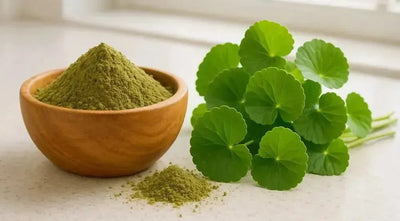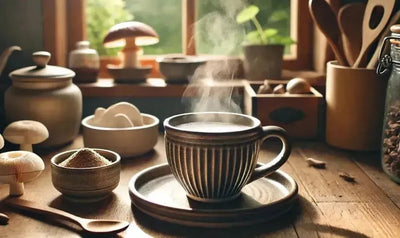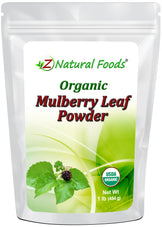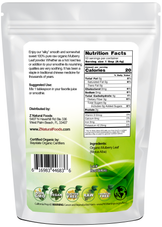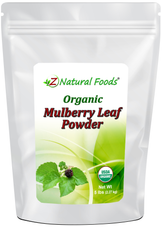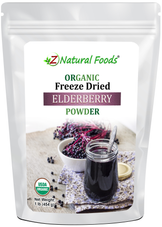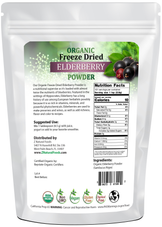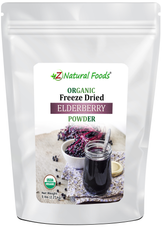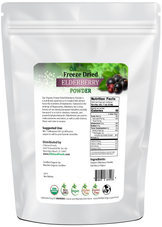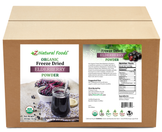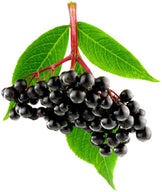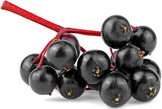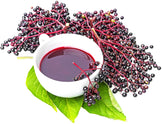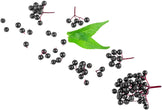Description
Description
Z Natural Foods takes pride in offering our customers a diverse range of foods in their most versatile form, and our Organic Mulberry Leaf Powder is a prime example.
This powder, created through a meticulous process of drying and milling the leaf, retains its natural nutrients, flavors, and other essential qualities.
Go here to review our Organic Mulberry Leaf Powder product description:
Today, we aim to answer some of the most frequently asked questions about this versatile product.
1) What is Mulberry Leaf Powder?
Mulberry leaf powder is a medicinal food product created from the leaves of mulberry trees (that can grow up to 80 feet and survive for hundreds of years).
Mulberry trees provide highly nourishing food sources with medicinal qualities from the leaf and fruit. These nourishing food sources are used in Western and traditional Chinese medicine and have many other unique applications that benefit society.
Mulberry leaf is the official diet of the silkworm, which creates one of the most expensive forms of silk, which is more dense than cotton, stronger than wool, and smoother, finer, and stronger than any other variety of silk.
Mulberry leaf is also mixed with the feed of dairy animals and improves the protein and fat quality of milk and the quantity of egg production in poultry.
2) What are the health benefits of Mulberry Leaf Powder?
Traditional Chinese Medicine looks at foods and herbs differently than Western medicine.
According to TCM, they are not defined as healthy or unhealthy but, instead, if it is the right food or herb for an individual at a specific time. According to Traditional Chinese Medicine (TCM), all foods and herbs have energy. TCM teaches us that foods and herbs have Yin/ Yang energy, five temperatures, five flavors, and four directions.
In these principles, Yin and Yang's action is the general property, and temperature is the extremeness of the properties. In simple terms, Yin is cooling, builds blood, and has downward moving energy.
Yang is warming, energizing, and has upward-moving energy. The primary system used in TCM is tonic herbalism, which other forms of medicine would call tonics with adaptogen-like qualities.
Mulberry leaves, also known as Sang Ye, are considered cold and bitter, have an affinity for the liver and lungs, and release the exterior. “Release the exterior” refers to promoting sweating in order to expel pathogens from superficial levels of the body.
Exterior in TCM refers to the location between the muscle and surface of the skin and where your defensive Qi resides. This is the first level of defense against external pathogens. According to TCM, mulberry leaves
- Clear heat, especially in the lungs with associated dryness
- Clears and soothes the liver
- Cools the blood
- It dispels wind. Wind is considered the spearhead of all illnesses in TCM because it serves as a vehicle to carry undesirable influences into the body. Wind can invade from the outside (external wind), disturbing Lung Qi, or be generated internally, disturbing Liver Qi.
However, Mulberry leaf has applications in Western Medicine too.
3) Does Mulberry Leaf Powder help with blood sugar levels and aid in weight management?
In order to discuss these topics, it is vital to understand metabolic syndrome. According to Western Medicine, Metabolic syndrome is a term used to describe a group of conditions (blood pressure, blood sugar, and lipids) that raise your risk for more severe conditions, which are directly connected to how efficiently your metabolism works.
Western medicine defines metabolism as enzymatic changes that take place in a cell or organism. These changes create energy and the materials cells need to grow, reproduce and stay healthy. In simple terms, metabolism is the physical and enzymatic processes by which your body changes what you eat and drink into energy by mixing calories and oxygen to create said energy. Therefore, the more efficiently your metabolism runs and converts your calories into power, the greater your chance of living a healthy, vibrant life.
Even at rest, the body needs the energy to support a wide range of life-sustaining functions like breathing, sending blood through the body, and balancing hormones. This concept is known as basal metabolic rate (BMR).
While muscle mass is the primary factor, BMR also depends on three other factors. First is body composition and body mass because people with more muscle burn more calories. The next factor is gender; men usually have less body fat and more muscle, so they burn more fat. The final factor is age. As people age, they often lose more muscle, thereby burning less fat.
Human research is becoming quite strong regarding the unique metabolic effects of consuming Mulberry leaf. The following was stated in another clinical trial discussing the impact of mulberry (Morus indica L.) therapy on plasma and erythrocyte membrane lipids in patients with type 2 diabetes:
- Patients with mulberry therapy significantly improved their glycemic control vs. glibenclamide treatment.
- The results from pre- and post-treatment analysis of blood plasma and urine samples showed that the mulberry therapy significantly decreased the concentration of serum total cholesterol (12%, p<0.01), triglycerides (16%, p<0.01), plasma free fatty acids (12%, p<0.01), LDL-cholesterol (23%, p<0.01), VLDL-cholesterol (17%, p<0.01), plasma peroxides (25%, p<0.01), urinary peroxides (55%, p<0.01) while increasing HDL-cholesterol (18%, p<0.01).
- Although the patients with glibenclamide treatment showed marginal improvement in glycemic control, the changes in the lipid profile were not statistically significant except for triglycerides (10%, p<0.05), plasma peroxides (15%, p<0.05), and urinary peroxides (19%, p<0.05).
- Both treatments displayed no apparent effect on the glycosylated hemoglobin concentrations (Hb A(1)c) in diabetic patients.
- However, the fasting blood glucose concentrations of diabetic patients were significantly reduced by the mulberry therapy.
Therefore, it was concluded that Mulberry therapy exhibits potential hypoglycemic and hypolipidemic effects in diabetic patients.
4) What are the anti-inflammatory benefits of Mulberry Leaf Powder?
Mulberry leaf is rich in a wide array of flavonoids that have been shown to support conditions rooted in inflammation. However, currently, there are only preliminary animal studies discussing the potential that mulberry leaf has on the inflammation cascade, and there is a need for human research.
We know that mulberry leaf seems to decrease Nitric Oxide and Prostaglandin E2 production. It has been stated that “The pathogenesis of inflammation involves inflammatory responses mediated by NO and PGE2. In this process, the expression of inducible nitric oxide synthase (iNOS) and cyclooxygenase-2 (COX-2) genes increase significantly, which thereby promotes NO and PGE2 synthesis. Therefore, regulating the overexpression of these mediators will decrease the damage caused by inflammatory responses.”
Therefore, while some preliminary research has been done, it does not conclusively show that mulberry leaf is an effective anti-inflammatory.
5) How can Mulberry Leaf Powder be used?
Truth be told, the mulberry leaf will not be setting the culinary world on fire anytime soon because it has a mildly sweet and earthy flavor and provides no significant enhancements toward texture profiles.
However, mulberry leaf is an excellent option as a simple medicinal tea, added to smoothies to support healthy blood sugar levels or as part of a TCM formula for specific conditions.
In conclusion, the Mulberry leaf has a unique history and robust application in both Eastern and Western Medicine.
Mulberry leaves and berries are considered powerful tonics used in many longstanding Traditional Chinese Medicine formulas.
Furthermore, there is a growing body of evidence supporting the use of mulberry leaves and berries to support various aspects of metabolic syndrome; however, more research is still necessary to validate other associated claims. We believe you may see great ideas and applications of this simple leaf in the culinary and medicinal world.
Go here for more information about our Organic Mulberry Leaf Powder:

